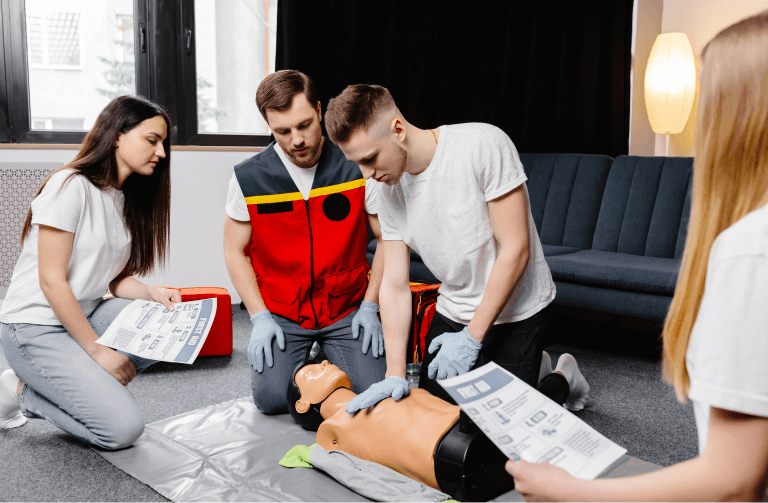Introduction
During medical emergencies, individuals trained in Basic Life Support, or BLS, can administer CPR, provide critical first aid, and effectively use automated external defibrillators (AEDs). Such interventions can help sustain life until advanced medical care reaches the victim.
Healthcare professionals like doctors, nurses, and paramedics need BLS certification to respond to life-threatening situations. The certification ensures that you have undergone specialized training to provide emergency medical care.
Similarly, teachers, lifeguards, coaches, childcare providers, and safety officers may be required to be trained in BLS. It prepares them to deal with emergencies at their workplaces until advanced help arrives.
However, BLS certification has limited validity. Therefore, it is necessary to renew it to continue providing lifesaving services.
In this article, we explain why BLS recertification is important and whether it is necessary for everyone to re-enroll in the course.
Understanding the importance of initial BLS certification
BLS certification is important as it trains you in basic skills to provide help to victims during medical emergencies. These emergencies include cardiac arrest, respiratory failure, choking, drowning, etc. With BLS training, you can save a person from death or prolong his or her survival until professional medical help arrives. You have the knowledge and expertise to administer cardiopulmonary resuscitation (CPR), use automated external defibrillators (AEDs), and relieve airway obstructions in patients. Your presence in emergencies gives a sense of safety to those affected and to their loved ones.
The need for BLS recertification
It is important to update your BLS certification to learn new skills and to continue providing lifesaving support to those in need. By renewing your certification, you expand your knowledge about the life-support techniques and practices that evolve with time in the medical field. Let’s see why BLS recertification is necessary for you:
- Skill retention: A BLS recertification course helps you refresh your knowledge and retain life-saving skills. You learn new techniques and practices to effectively perform essential skills like chest compressions, rescue breathing and AED.
- Protocol updates: Medicine and healthcare are dynamic and continually evolving. Breakthroughs in research and best practices continue to emerge to provide patients with optimal care and comfort. BLS recertification courses ensure that you are aware of the latest guidelines and protocols to be followed while providing emergency medical care.
- Confidence and preparedness: Your BLS recertification prepares you to respond to emergencies confidently and effectively. After going through BLS training, you will be able to perform life-saving skills in high-stress situations with ease.
- Legal and regulatory compliance: Healthcare professionals must maintain valid BLS certification to ensure quality patient care and to adhere to regulatory norms. Many organizations and professions also require BLS certification from their employees to fulfill legal requirements. You can lose your license or employment if it is found that you continue to provide lifesaving skills without a valid certificate.
The BLS recertification process
You can either enroll in an in-person BLS recertification course or complete an online refresher course that culminates in a skills assessment. You receive updates on guidelines and protocols as you review and recall essential concepts. You also get the opportunity to practice and exhibit your skills in BLS, such as CPR administration and AED usage. Your BLS certification will be renewed once you complete the recertification course. Your current certification usually remains valid for another two years.
Is BLS recertification necessary for you?
BLS recertification is mandatory for healthcare professionals. It ensures that you can continue offering medical care to victims during emergencies. Besides, it helps you in your professional growth as you can easily find a better career opportunity by undergoing training in BLS.
Healthcare professionals who have to mandatorily apply for BLS recertification include:
- Doctors
- Nurses
- Paramedics
- EMTs
- Dentists
- Pharmacists
Besides, non-healthcare professionals like teachers, lifeguards, coaches, childcare providers, and safety officers may be required to be further trained in BLS. It prepares them to deal with emergency situations at their workplaces.
Conclusion
Initial BLS certification gives you the knowledge and skills to provide basic life-support skills in medical emergencies. You learn how to administer CPR, provide critical first aid care, and use AEDs. You have the confidence to act swiftly and appropriately in times of crisis. However, BLS certification remains valid for not more than two years and must be renewed. BLS recertification enables you to stay relevant by adopting the latest life-saving skills.
Recertification also keeps your confidence level high while you are updated with the latest guidelines and developments. Furthermore, recertification reflects your continuous commitment to contribute to the safety and well-being of others. BLS recertification has more far-reaching implications than just renewing a certification to show adherence to legal requirements. It reaffirms your commitment to continue helping those in distress.
Stay in touch to get more updates & news on Gossips!




